Powering innovation, accelerating discovery
The Frost Institute for Chemistry and Molecular Science opens its doors on the Coral Gables campus.


The Frost Institute for Chemistry and Molecular Science opens its doors on the Coral Gables campus.

As we at the University of Miami embark on a new year with renewed energy and purpose, we pause to reflect on how far we have already come.
The philanthropic spirit ignited by Ever Brighter: The Campaign for Our Next Century has fueled innovation and opportunity across our institution and beyond. The generosity of ’Canes alumni and friends, as spotlighted in these stories, sparked a record-breaking year of achievements and impact—and we look forward with increasing excitement to our centennial in 2025.
Our physicians and scientists continue to advance life-changing research. Our students—the vibrant heart of any university—have benefitted from new academic scholarships, experiential learning opportunities, and the recruitment of stellar faculty. Our communities have been uplifted by the sustained scientific, clinical, scholarly, artistic, athletic, and educational excellence animated by your philanthropy.
Thank you for supporting our boldest aspirations and helping the U become an ever-greater force for good, and my very best wishes for 2023.
President

Julio Frenk
Senior Vice President for Development and Alumni Relations
Joshua M. Friedman
Associate Vice President, Campaign and Strategic Initiatives
Darlene Rebello-Rao
Executive Director, Development Communications

Tamara Klingler
Senior Director, Development Communications
Maria Aizcorbe
Julie Levin
Director, Development Communications
Pamela Edward
Priyanka Sinha
Editor
Pamela Edward
Senior Art Director
Sau Ping Choi
Contributors
Jenny Abreu
Benjamin Estrada
Joey Garcia
Mikayla Gowaty
Barbara Gutierrez
Lisette Hilton
Robert C. Jones Jr.
Jeanne Krull
Joshua M. Friedman, CFRE Senior Vice President for Development and Alumni Relations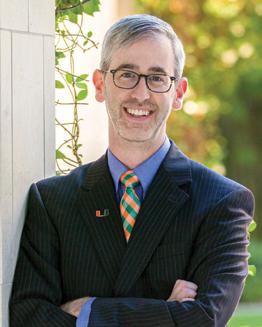
Maeve McQueeny
Miami Athletics
Illuminate is published by the University of Miami Division of Development and Alumni Relations. Reproduction in whole or in part without written permission is prohibited. Comments and opinions expressed in this magazine do not necessarily reflect those of the University of Miami or Illuminate staff.
©2022 University of Miami, an Equal Opportunity/Affirmative Action employer. All rights reserved.
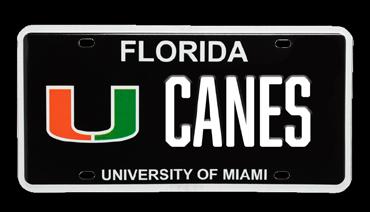
The Phillip and Patricia Frost Institute for Chemistry and Molecular Science opened its doors in November 2022, ushering in a new era of interdisciplinary research at the University of Miami. The first of a series of Frost Institutes that will accelerate discovery at the intersection of science, technology, engineering, and mathematics, it was set in motion by the landmark $100 million gift from the Frosts in 2016.
Scan the QR code to learn more.
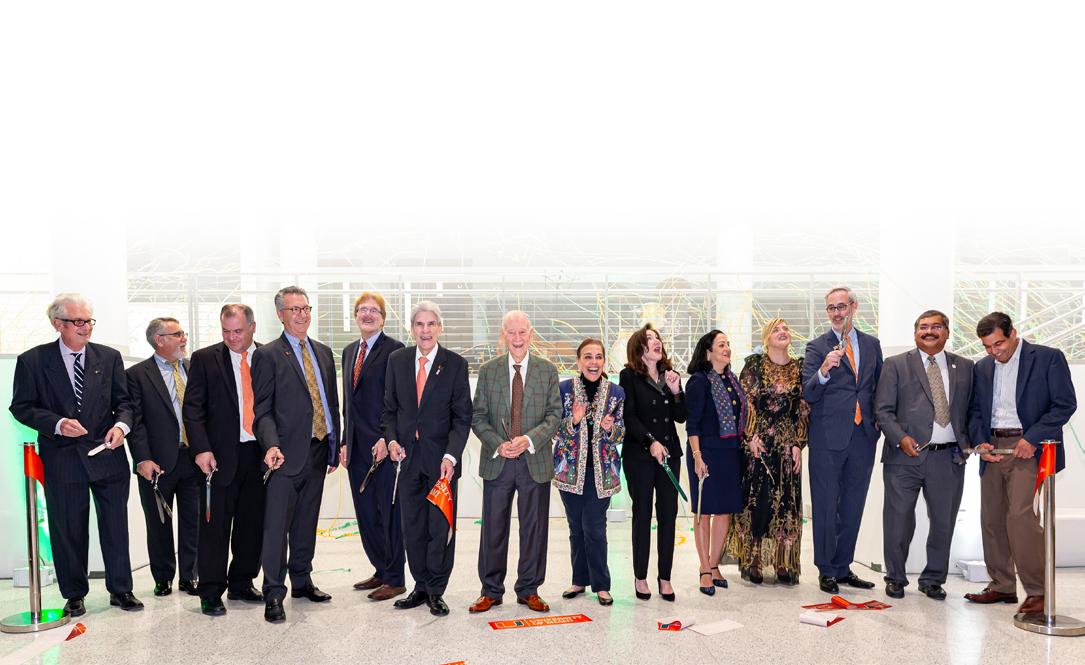
in 2018, the BuildLab is named in honor of Miller and his late father, Billy E. Miller, who founded the Miami-based construction firm First Florida in 1963 and served on the University’s Board of Trustees and Citizens Board.
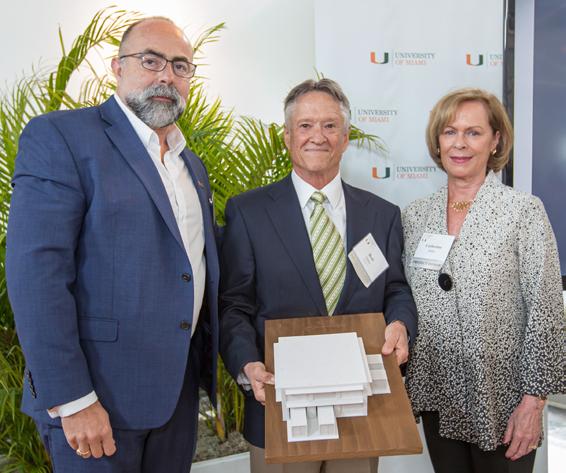
Designed by Rocco Ceo, professor of architecture, the BuildLab houses the school’s design/build program. Here, students can bring their design ideas to life at large scale and in a safe, controlled environment sheltered from the vagaries of the South Florida weather.
Not far away is the B.E. and W.R. Miller Fabrication Lab, also named in honor of the father and son, where students and faculty members employ a wide range of digital and analog tools, including a robotic arm, to create design prototypes. The BuildLab and Fabrication Lab are emblematic of the immersive learning-bymaking that is foundational to architecture education.
As a licensed general contractor and realtor, Miller has worked with architects throughout his career. He is a member of the School of Architecture Dean’s Advisory Committee, and he was instrumental in developing and promoting the Master of Construction Management program, serving as chair of the program’s industry advisory board.
In 2020 he funded a construction management scholarship, opening doors to opportunities for students to gain the knowledge and experience that is highly sought-after by architectural, engineering, and construction firms.
Now, Miller and his wife, Catherine, have cemented their legacy at the School of Architecture through two planned estate gifts that will help the school advance its core vision of building urban resilience through cross-disciplinary engagement and experiential learning.
When W.R. “Bob’’ Miller was an architectural engineering student at the University of Miami in the mid-1970s, the School of Architecture was still several years away from its emergence as an autonomous academic unit.
Yet, among the faculty members Miller encountered during his time at the College of Engineering were Andrés Duany and Bernardo Fort-Brescia, now two of the most renowned names in contemporary architecture.
Learning from these “great professors,” as he calls them, kindled in Miller a passion for helping future generations of students bridge the gap between architectural design and construction, through practical, hands-on learning.
This passion was manifested when the Millers made a gift in 2016 to name the B.E. and W.R. Miller BuildLab. Dedicated
Rodolphe el-Khoury, dean of the School of Architecture, pointed to the Millers’ investment in the BuildLab as the catalyst that precipitated a culture change at the school, with resources and infrastructure provided to support experiential learning. “The students are now learning by making,” el-Khoury says, adding that “the curriculum will continue to evolve with this kind of support.”
“We see [our giving] as a way to give back to the construction community and to my alma mater,” Miller explains. “I love what Rudy el-Khoury and his staff are doing to make the school special. Their efforts are seen at every level: quality of professors, the physical plant, curriculum, and new areas of learning. It’s exciting.”
Miller hopes that the planned gifts will help to propel the School of Architecture’s rank and similarly elevate the University of Miami.
“Miami is a great city. Great cities need great universities,” Miller says. “The relationship is symbiotic and must be fed. [Giving and volunteering] gives one a great feeling of being a part of the community.”
With two planned gifts, alumnus Bob Miller and his wife, Catherine, are creating a lasting legacy for the School of Architecture and its students.Rodolphe el-Khoury, left, dean of the School of Architecture, with W. R. “Bob” Miller and his wife, Catherine, at the dedication of the B.E. and W.R. Miller BuildLab.
practice of elections and governing.
“The University of Miami is the ideal academic venue for the democracy center,” says Leonidas Bachas, dean of the College of Arts and Sciences. “Florida has a reputation as an electoral battleground, a proverbial swing state that often draws national attention. Our proximity to Latin America also places us in an ideal spot to study democracy in the Americas and beyond.”
Jeffrey Duerk, executive vice president for academic affairs and provost, points out that many students “are participating in the democratic process for the first time, or, for some of our international students, seeing it in action for the first time. The Hanley Democracy Center and the Hanley endowed chair will support the kind of scholarship and dialogue that helps our entire campus community to better understand our rights and responsibilities and the impact of our choices as engaged citizens.”
Launched in 2022 and housed in the College of Arts and Sciences, the Hanley Democracy Center was established through a generous commitment from George Hanley, a financier, entrepreneur, and philanthropist who has extensive experience in founding and building successful companies in the financial and commercial real estate industries.
The gift will also create The George P. Hanley Endowed Chair in Democracy, to be awarded to a tenured professor with expertise in the field.
Hanley, who has a history of endowing educational institutions and believes in “nourishing, mentoring, and investing” in young people, says that it is the right time to establish a democracy center.
“People need to have civil discourse,” he
says. “I find that when I have civil discourse with people, we are much closer in views than the cable news shows would have us believe. This is a center to look at different ways of thinking and to bring people together. Because at the end of the day, we are all Americans,” he adds.
“This is a very important time to open up this center,” says Gregory Koger, chair and professor of political science, noting the challenges to democracy both in the United States and globally.
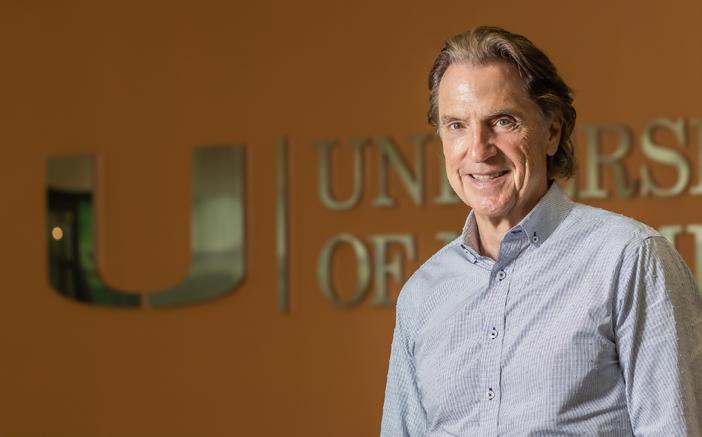
According to Koger, the center’s mission is to study the practice of democratic politics and share knowledge about politics with the public, offering citizens, scholars, and public officials the information they need to make informed decisions about the structure and
Koger notes that there are clear signs that democracy has been weakened, both nationally and internationally. In the United States, those signs include an increasingly polarized electorate and a diminishing trust in institutions, including the press and political institutions, he says. Globally there are also indications of governments turning toward authoritarianism, he added.
“Our role will be to understand why some governments are turning to authoritarianism and how it is happening,” Koger adds. “And [we need to] try to shore up the institutions and practices, so that it does not continue.”
To fulfill its mission, the center will offer research grants to faculty members who study democratic policies, conduct public programming, and host discussion panels, as well as provide support to students through internships.
In its programming, the center will explore issues of redistricting in Florida as well as in other states, how Congress could be more effective, and how campaigns are financed and the political implications of that financing, says Koger.
The preeminent institution of its kind in South Florida, the nonpartisan George P. Hanley Democracy Center will shed important new light on the practice of the democratic process.
When Eveleen Lorton started teaching at the University of Miami in 1966, she could have hardly predicted the impact her career would have on future generations of aspiring educators.
During her time at the School of Education and Human Development (SEHD), Lorton established herself as a master teacher and pedagogical pioneer. In 1984 she co-founded the Glazer & Lorton Writing Institute at the school.
A collaboration of the University and Miami-Dade County Public Schools, the Writing Institute offers instruction in the teaching of writing with a focus on research-backed methodology, experimentation, and personal exploration to encourage curiosity and nurture critical thinking skills in students.
Lorton passed away in 2021, but her commitment to educators will continue thanks to a planned gift establishing a scholarship fund for students planning careers in teaching, an endowed honorarium to be awarded annually to a faculty member for outstanding teaching, and an additional gift in support of the work at the Institute.
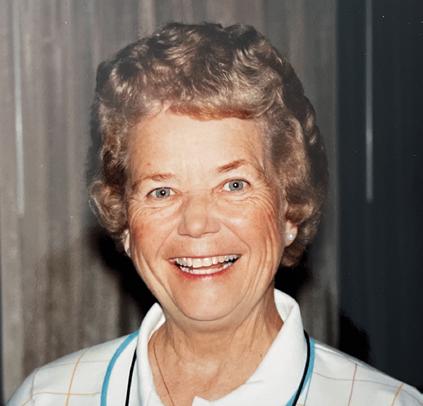
“This gift is game-changing because it helps SEHD to strengthen its programming, rewards excellence in teaching, and invests in aspiring educators looking to pursue a career in teaching, attracting educators from more diverse backgrounds in the process,” says Laura Kohn Wood, dean of the School of Education and Human Development. “Dr. Lorton nurtured such a culture, ethos, and pedagogical model during her time at the Writing Institute that it can continue her mission of inspiring educators for many years to come.”
Joanie Cobo, B.A. ’92, co-director of the Writing Institute and assistant principal at a Miami-area K-8 school, recalls first attending the Institute in the 1990s as a recent graduate hoping to pursue a career in teaching.
Cobo had volunteered at the summer session at the Writing
Institute, she recalls, to earn “a muchcoveted ticket to the lectures.” She found her first job using connections from the workshop, but she also found a mentor and close friend in Lorton, whom she describes as someone who made “students feel as if they could be geniuses and teachers feel like they could do anything.”
Cobo remembers Lorton as someone who “sought to make sure that we empower ourselves to find and impart joy through our profession.” Cobo says the gift also demonstrates that Lorton “understood the collective urgency to make sure that teachers had what they needed to instruct.”
Shawn DeNight, M.A. ’94, Ph.D. ’94, a facilitator at the Writing Institute and high school teacher, says Lorton’s gift “really captures her spirit.” DeNight describes Lorton as someone who “always looked for a way to tell people how important they were to her or how much she loved them.”
Even so, friends and colleagues from the Writing Institute were surprised when they began receiving hand-written letters filled with kind thoughts, fond memories, and well-wishes from Lorton in the weeks following her passing.
DeNight recalls the day he received his letter, saying, “it was like it came from heaven. Since all of us at the Writing Institute were like her extended family, it felt like she was speaking to us from the grave.”
Dick Smith, Lorton’s nephew, says, “Eveleen loved people and made certain they knew it. Truly, Eveleen’s life song was sung in tune with her heart and mission for the betterment of others. Her heart and mission are reflected beautifully in her most generous gifts and years of dedicated service to the University of Miami.”
Cobo echoed Smith’s sentiment, saying the main thing to remember about Lorton is this: “She always thought of what she could do for others—it was a life of service. She was raised by a pastor, so I think she grew up understanding the idea of dedicating oneself to others and brought that with her into academia.”
Scheduled to open in 2025, the state-ofthe-art facility will be led by two endowed chairs and include researchers and physicians who will advance the center’s mission. Shriners Children’s Orthopaedics Center at UHealth Jackson Children’s Care will provide worldclass care for children with traumatic injuries and debilitating conditions such as spina bifida, muscular dystrophy, and cerebral palsy.
“The new Shriners Children’s Orthopaedics Center will be a shining example of what is possible when we combine the best of our institutions: scientific research, clinical practice, and community service,” said President Julio Frenk at the press conference announcing the partnership.
Sarah Lunn praises the outstanding care from Brian Black, M.D., and Holtz Children’s Hospital when her daughter Sofia’s femur was shattered in a boating accident.
“Sofia has since been able to resume her favorite activities, such as horseback riding, swimming, and rock climbing, five months after her traumatic injury,” Lunn shared at the
gathering. “We are so grateful to her entire medical team, who helped us navigate such a traumatic experience in our lives. We are so happy to say that she is 90 percent back to normal, and we could not be happier with the results of her surgery.”
Brayan Solano is grateful to Shriners Hospitals for Children for the exceptional care he received as his parents sought medical treatment for a deformed tibia in his right leg.
“With the help of Shriners Children’s, I regained my ability not only to walk with my prosthetic leg, but also be able to play my favorite sports, like basketball, baseball, and football,” Solano says. “The hospital’s extraordinary care impacted me immensely, and my relationship with the medical staff and my prosthetist is what continuously pushed me to keep going and never give up on my hopes and goals.”
Solano says he is confident that the Shriners Children’s Orthopaedics Center at Jackson Health will offer hope and healing to children all around South Florida.
The partnership will help UHealth and the
University of Miami Miller School of Medicine continue to retain and recruit top-level physicians who will provide innovative clinical care, research trials, and new therapeutics. The next generation of orthopedists learning at the Miller School will also receive an invaluable level of cutting-edge clinical training, giving them the tools to transform the practice in South Florida and beyond.
“The caliber of our leadership and the unwavering dedication we have to our patients, combined with the incredible reputation of the Shriners, will take us even further in our pursuit of excellence,” says Dr. Dipen Parekh, chief operating officer for UHealth.
Shriners Children’s Orthopaedics Center will align with other UHealth/Jackson signature pediatric services, including organ transplant, cardiac care, neonatology, cancer treatment, neurosurgery, and more. The new facility will be located steps from the 379bed Holtz Children’s Hospital and alongside the Christine E. Lynn Rehabilitation Center for The Miami Project to Cure Paralysis at UHealth/Jackson Memorial.
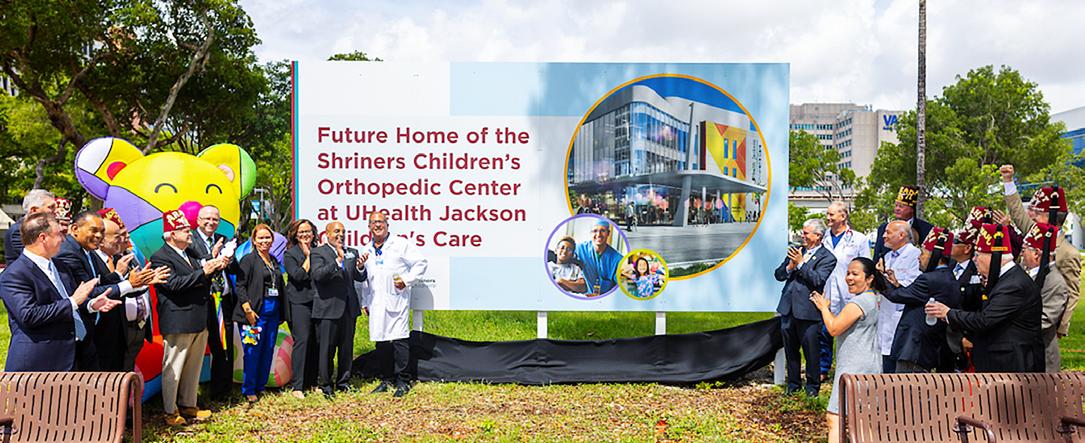
A vital new partnership with Shriners Hospitals for Children will enable UHealth – University of Miami Health System and Jackson Health System to create a sophisticated facility dedicated to programs and treatments that will help pediatric orthopaedic patients.The partnership between Shriners and UHealth will help the Miller School of Medicine recruit and retain top-level physicians and educate the next generation of orthopedists through leading-edge clinical training.
Robert and Florence Werner traveled the world collecting art glass. Their extraordinary collection
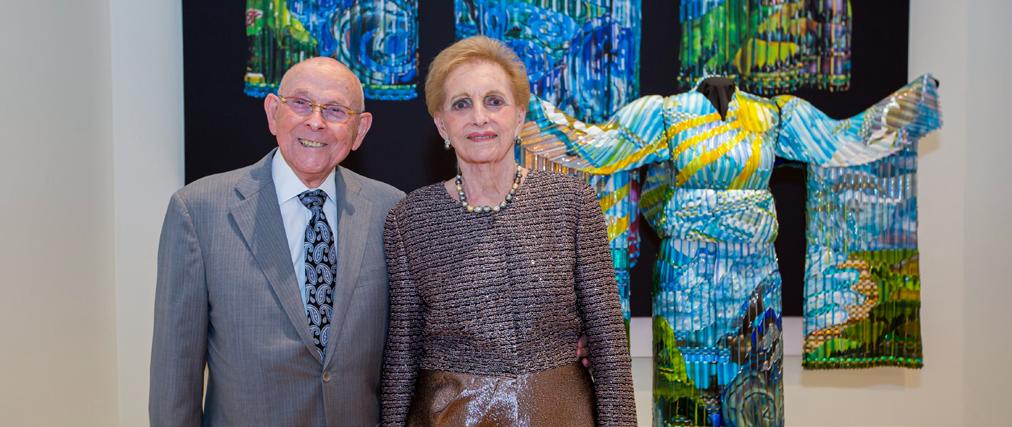
the Lowe Art Museum.
To listen to Robert Werner recount it, he and his late wife, Florence, were novices when they purchased their first piece of art glass.
It was in the early 1990s, during a two-week business trip in Europe. “Halfway through, we ended up stopping in Venice, where we did a walking tour, Werner recalls. “And we ended up at a place to buy things.”
That place was a showroom for art glass from Venetian master makers, whose workshops are centered on the island of Murano in the Venetian lagoon. Werner was captivated by the figure of a woman by the late Loredano Rosin, who used a technique, first perfected by Murano glassmakers in the 15th century, that imparts streaks of rich color to the glass, making it look like marble.
“It was a beautiful piece, and [the technique] has a history that is unique,” Werner says. “That’s how we got started.” The Werners’ collection now comprises 270 pieces of late 20th and early 21st century contemporary art glass, from established masters to emerging talents.
Before Florence’s death in 2020 at age 85, the Werners committed to leaving the collection to the Lowe Art Museum, intending to move the pieces for display and long-term preservation as space became available.
In 2021, Werner made a testamentary gift of $1 million on his and Florence’s behalf to support the collection’s conservation, storage, and display at the Lowe. “We recognized that when you give something to a museum, in addition to the artwork, you need to consider providing funds to take care of it,” he says.
“The Werners’ gift to the Lowe is truly transformative—for the
Lowe, for the University of Miami, for our community, and for the wider world of contemporary glass,” says Jill Deupi, chief curator at the Lowe and director of Beaux Arts. “Building on the incredible foundation laid by Myrna and Sheldon Palley and other supporters of our Palley Pavilion, this donation will enable us to explore the history of the Studio Glass movement in even greater detail through key masters and pivotal masterworks.”
In 2018, the Werners’ collection was celebrated at the Lowe exhibition titled “Dialogues: Studio Glass from the Florence and Robert Werner Collection.” Sixty pieces were showcased, most notably the striking “Summer Zenith Kimono,” by Eric Markow and Thom Norris, who devised a technique for weaving strips of glass into an intricately designed and richly textured life-sized garment.
Werner, whose love of Japanese art and culture dates from his army service in Tokyo during the Korean War, first saw the kimono with Florence at an art glass show. “It blew us away,” he recalls.
The kimono exemplifies the Werners’ approach to collecting. Werner, a materials engineer by profession, says: “Florence was always attracted to the beautiful pieces, while I was more inclined to the technical side of glass art. We always found common ground and that was how we bought the pieces that we have today.
“For over 25 years Florence and I traveled the world together on amazing trips buying art glass. We have collected so many pieces over the years, it’s as if we are shepherds taking care of a flock. These pieces belong to the community for all to be appreciated and enjoyed. My wife and I are truly leaving a legacy, and we are delighted to have the collection in the hands of the Lowe Art Museum.”
will ultimately find a permanent home in
The seeds of Paul J. DiMare’s brilliant career as a successful businessman and one of the nation’s most influential farmers were sowed nearly 95 years ago on the streets of Boston. Back then, his father and two uncles sold fresh vegetables from a pushcart in Haymarket Square, growing their small venture into a lucrative repacking plant for tomatoes, vegetables, and nuts.
The family would eventually invest in farming, and when DiMare moved to Florida in 1964 at the age of 23, he would expand operations to production and distribution locations in Florida and throughout the United States.
Today, DiMare Fresh is one of the nation’s largest providers of value-added distribution services in the form of repacking, ripening, storage, consolidation, and delivery of refrigerated foods, specializing in fresh produce and floral, including plants.
DiMare, chief executive officer and president of DiMare Fresh and a longtime University of Miami trustee and benefactor, passed away on December 30.
“One of our University’s most ardent supporters, Paul lived a life worth emulating, marked by generosity, leadership, and a gregarious spirit that made him unforgettable,” President Julio Frenk says. “He poured his heart into his family, his community, and his every endeavor. We have been fortunate to know him personally and we mourn the loss of this great man.”
Even as he succumbed to the complications of amyotrophic lateral sclerosis
(ALS), or Lou Gehrig’s disease, DiMare continued to practice goodwill, making phone calls late into the evening to rally support for finding a cure for the progressive neurodegenerative disorder—not for himself but for the thousands who suffer from it.
“It kept him going,” Swanee DiMare says of her husband. “He read and learned everything he could about ALS and the medical research that was being done to find the cause and a cure. And he did so right up until his death.”
DiMare served on the University’s Board of Trustees since 2004, holding various leadership positions and dedicating himself to uplifting the institution. He was one of the University’s most generous philanthropists— from athletics and the arts to business, scientific research, and medical education, his generosity has made an impact across the institution.
In 2014, he and Swanee made a transformational gift for medical student scholarships at the Miller School of Medicine.
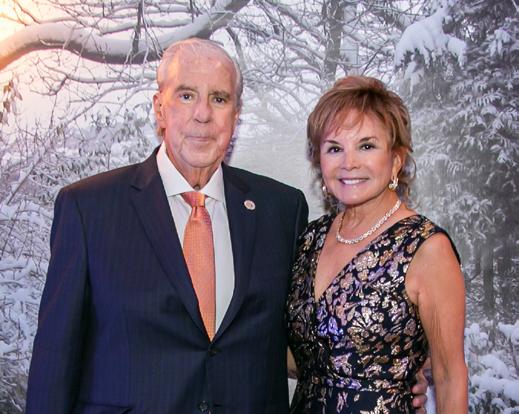
He recently funded an endowed chair at Sylvester Comprehensive Cancer Center. The Paul J. DiMare Endowed Chair in Immunotherapy, which is held by Dr. C. Ola Landgren, promises to usher in a new era in breakthrough cancer research.
The DiMare Champions Plaza at Alex Rodriguez Park at Mark Light Field, where DiMare’s son, Gino, serves as head coach of the Hurricanes baseball team, is named in DiMare’s honor.
DiMare and his wife also helped make possible the Frost School of Music’s 200-seat recital hall, the lobby of which was named the Swanee and Paul J. DiMare Lobby. He was inducted into the University’s Iron Arrow Honor Society in 2017.
In addition to his volunteer service to the University, DiMare served on the boards of numerous South Florida non-profit organizations. He was honored with the Ellis Island Medal of Honor, the Red Cross Humanitarian of the Year Award in 2007, the 2007 Women’s Guild of the Miami Project Ann Bishop Spirit of Excellence Award, and the 2013 Southeast Produce Council Lifetime Achievement Award.
give.miami.edu/DiMare
provide support to fight neurodegenerative disorders that remain today without a cure.
University of Miami Trustee Paul DiMare, who passed away in December, was one of the University’s most passionate and generous benefactors, and his legacy extends across the institution.
Patti and Allan Herbert met and fell in love at the University of Miami nearly seven decades ago.
Now, Allan Herbert is continuing their lifelong love affair with a challenge gift to the Frost School of Music that will help propel music performance and education forward through state-of-the-art technology.
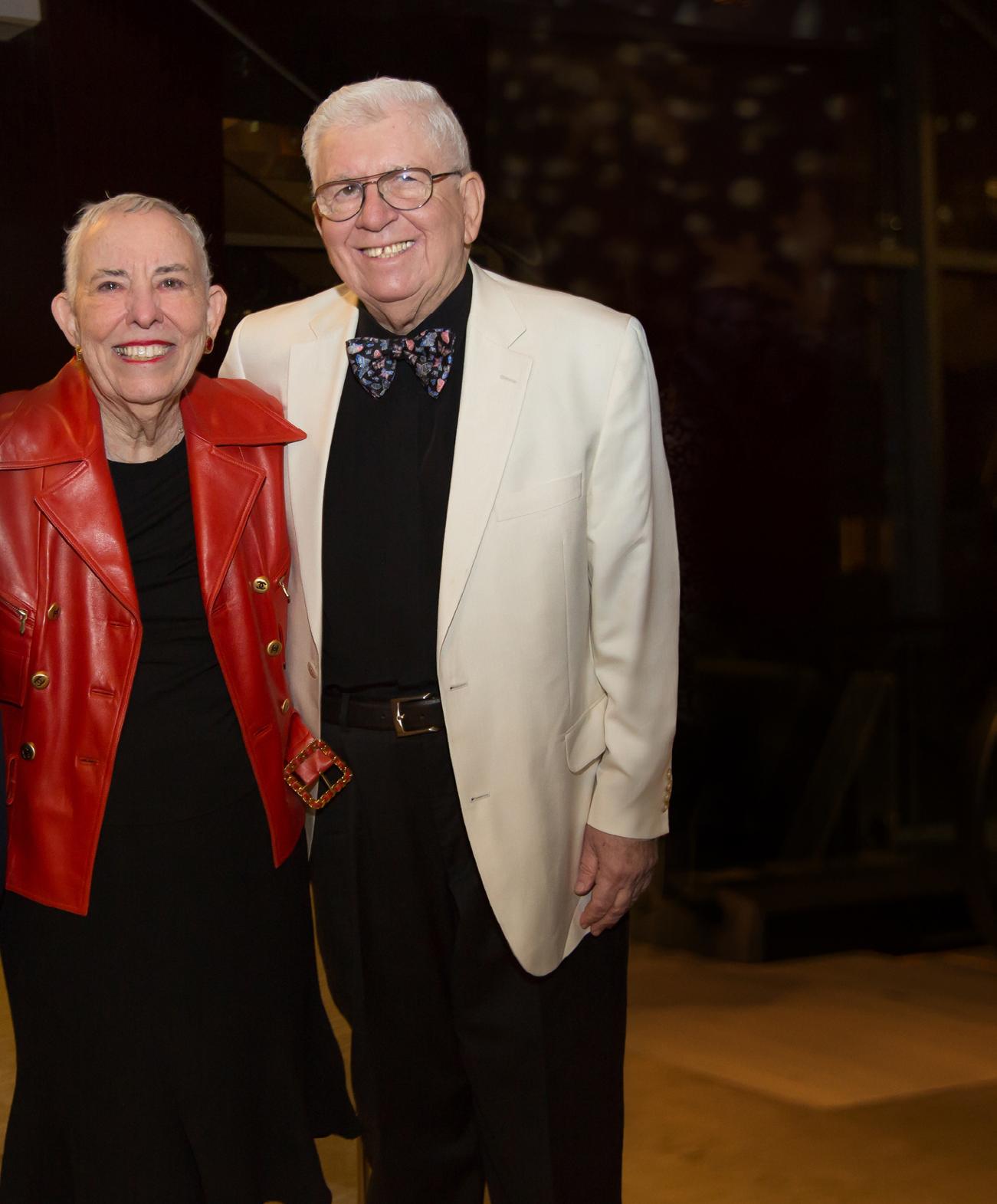
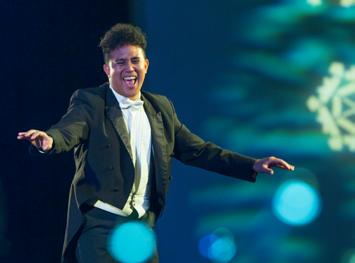
During their 66 years together, Allan Herbert says his late wife Patti always prefaced her philanthropic endeavors with a simple statement: ‘I’ve got an idea.’
“For Patti, everything was possible,” says Shelton G. “Shelly” Berg, dean of the Phillip and Patricia Frost School of Music. “She would get that sparkle in her eyes [as if to say] ‘okay, we’re going to do something.’”
Berg cites Winter Wonderful, the Frost School’s holiday concert and dinner, as an example of Patti’s vision. “Early in my tenure, Patti said to me, ‘we could do better with the dinner—let’s rebrand it, let’s rethink it.’” Fifteen years later, Winter Wonderful continues to raise considerable funds for the Frost School’s choral program and the Donna A. Shalala MusicReach Program. Allan Herbert says simply, “Patti created Winter Wonderful.”
Now, more than two years after Patti’s death at age 84, it’s Allan Herbert with the idea that is helping to cement their legacy at the Frost School. He has pledged $1 million as a matching gift challenge to encourage other donors to support the construction of the Knight Center for Music Innovation, the stateof-the-art performance and technology center
scheduled for completion in 2023.
“This challenge from Allan will get us over the fundraising goal line for this remarkable project,” Berg says. “And all of us at the Frost School are deeply grateful for Allan and Patti’s unwavering support, and further touched that Patti’s legacy will be intertwined with this wonderful facility.”
Under the challenge, Herbert will match all cash gifts received from other donors toward the building fund until the $1 million mark is reached. The second-floor lobby of the Knight Center will be named the Patti and Allan Herbert Promenade.
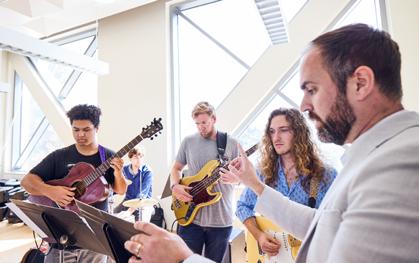
“Patti believed strongly in leveraging funds to encourage other donors to give,” explains Herbert. “The Knight Center is truly a memorable addition to the Frost School, with very impressive technology, [including] the wall that will be used to bring the music from inside the concert hall to the outdoors. I think Patti would be proud of this new gift.
“We have loved the music of Shelly Berg and the Frost School for many years. We are thrilled with everything they’ve accomplished and the programs that Shelly has created that excel in producing superb instrumental musicians and vocalists.”
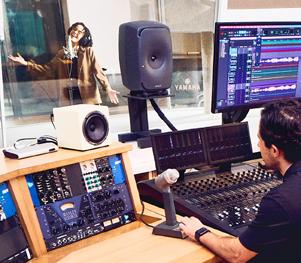
Among the latter is the Summer in Salzburg program. As Berg recalls, “[The Herberts] saw the wonderful opera training program that we have, and the opportunities it provides that students never get unless they go to a place like Salzburg in the summer. They stepped up with an endowed gift to name the program and fund more scholarships for students to go.”
The Herberts have generously supported many areas of their alma mater, where they met as undergraduates in 1954. In 2019 a landmark donation brought their lifetime giving to the University to more than $100 million. In their honor, the University named the Patti and Allan Herbert Business School.
“Patti and Allan’s magnificent generosity has transformed the Frost School, the Miami Herbert Business School, and nearly every corner of the University,” says Josh Friedman, senior vice president for development and alumni relations. “From the Patti and Allan Herbert Wellness Center to their support of the Sylvester Comprehensive Cancer Center, the Lowe Art Museum, student affairs, alumni relations, and much more, their impact will be felt for generations of students to come.”
had transformed their own lives, they have been dedicated to the University of Miami and its students, as donors, volunteers, mentors, and, in Susan’s case, as an adjunct faculty member at the School of Law.
When Scott Kornspan arrived at the University of Miami as a first-year student in 1982, he fell in love with an institution that was working hard on plans for what he calls “a glide path to greatness.”
Later, as a student at the School of Law, Scott met classmate and fellow New Yorker Susan Fleischner. The two later married and have spent the past 32 years building distinguished legal careers in South Florida. At the same time, recognizing how their educations
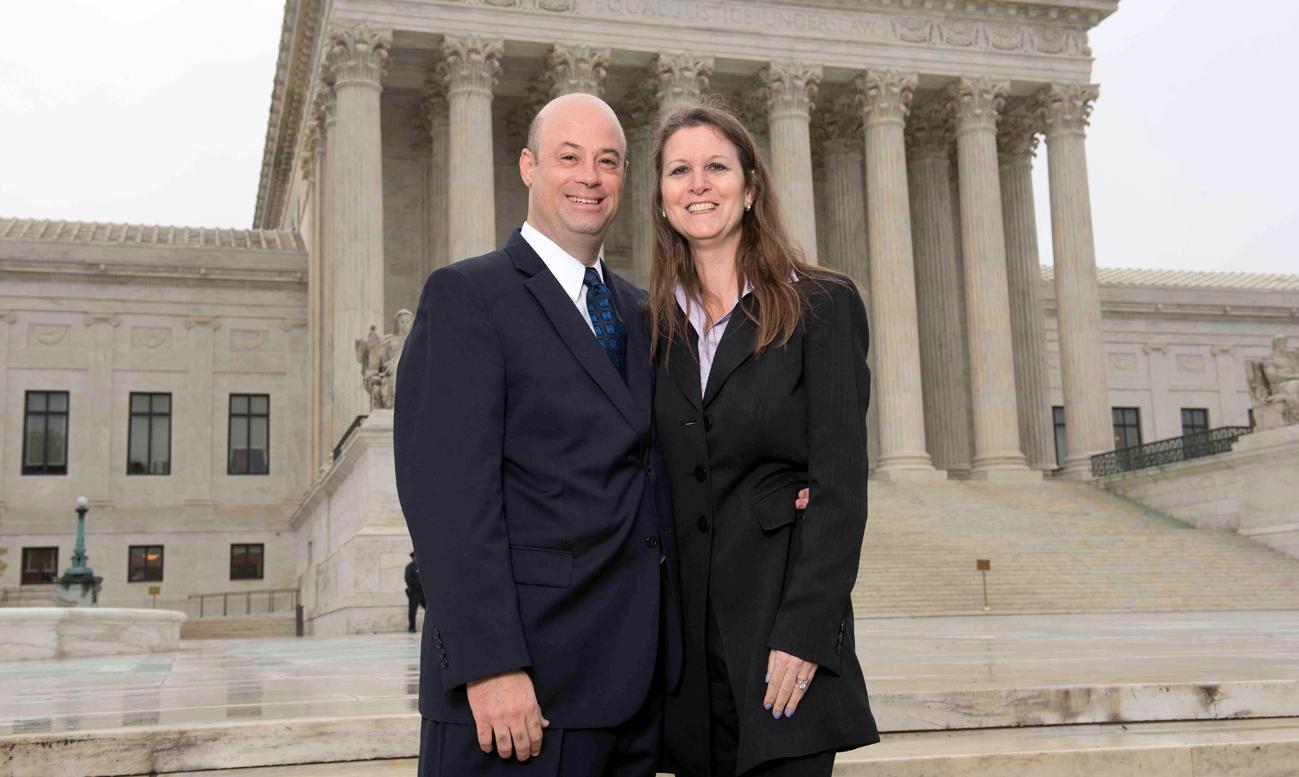
In 2013, the Kornspans named the Scott and Susan Fleischner Kornspan Study Lounge, a 24-hour, 7-day academic and gathering space on the first floor of the Shalala Student Center, designed to help students succeed. Now, they have cemented their legacy at the University through a major gift of $5 million, which will endow three new scholarship programs for Kornspan Scholars: The Scott and Susan Fleischner Kornspan Opportunity Scholarship, Merit Scholarship, and Law Scholarship.
The Opportunity Scholarship is designed to help the University attract high-achieving first-generation students, especially those from underrepresented backgrounds, who might not have an opportunity without financial assistance. With the Merit Scholarship, the Kornspans aim to help the University
After three decades of devoting their time, talents, and resources to the University of Miami and its students, alumni Scott Kornspan and Susan Fleischner Kornspan are making an even more lasting impact by creating three new categories of endowed scholarships.
compete for and matriculate the most accomplished students who have options at other top-tier private institutions.
The Law Scholarship was crafted to ensure that top first-year law students can continue their studies. As Scott explains, they did not want a “situation where someone arrived at Miami Law with no merit scholarship, did a great job their first year, and now, if they are not given additional financial aid, they could not afford to stay at the U and instead go elsewhere. This category is designed in part to help retain great students with financial need.”
As Susan recounts, it was only through donor-funded financial aid that she was able to return after her first year of law school. “Being a product of the financial aid system, I always felt that when I got accepted to and attended law school and graduated, part of that process included giving back. If my predecessors had not done that, I would not have been able to continue my studies,” she says.
Patricia A. Whitely, senior vice president for student affairs, has worked with the Kornspans for many years and counts them as close friends. “Scott and Susan have a deep and abiding commitment to the U,” Whitely says. “Their incredible gift to provide significant scholarship support to our students is truly welcome—generations of University of Miami students will now be able to make an impact thanks to their generosity—and especially meaningful, given their own legacies at the U.”
The Kornspans are, in Susan’s words, “motivated by a profound desire to open doors to opportunity and enrich the student experience.” And, as Josh Friedman, senior vice president for development and alumni relations, remarks, “Susan and Scott understand the power of endowed scholarships. Their planned gift will create brighter opportunities for future generations of University of Miami students, in perpetuity.”
“We are looking to help the University of Miami create the broadest student opportunities, and the best student
experience,” Susan says. “Education transforms you in terms of what you learn in the classroom, but the diversity of who is in the classroom learning with you, and with whom you socialize outside of the classroom, is equally transformative. Learning and engaging with students of different perspectives enhances your academic and personal growth and impact.”
As a School of Law alumna, Susan was inducted into Iron Arrow, the University’s premier honor society. As a law student, she also was inducted into The Order of Barristers, in recognition of her exceptional skill in written and oral advocacy; won the state moot court competition; and was a member of the Moot
As an undergraduate at the University, Scott was the first two-time student body president and served as a student representative to the Board of Trustees for two years. He was tapped into Iron Arrow as a junior and became Chief (now chair) of the society while at the School of Law.
“I spent four years of college learning so much—and the things you learn outside the classroom happen in multiple places,” Scott says, alluding to his involvement in many projects that elevated the University’s profile under then President Edward T. “Tad” Foote II. “Working side by side with President Foote and his team, we significantly improved academics, student life, and campus
Court Board, including holding an executive board position and teaching advanced appellate advocacy for two semesters.
Susan has worked tirelessly with School of Law faculty members, students, and administrators to advance the Moot Court program. Since she became chair of the Moot Court Alumni Advisory Board, the students consistently achieve success in national moot court competitions and rankings.
“I always want to fix or improve what’s in front of me, especially if it will help students,” she reflects. “And the Moot Court Board was the program that presented itself to me in this regard at a pivotal juncture in its history. Moot court is important not only because of the legal skills we are teaching students, but it also provides the students with the experience of leadership, the opportunity of running an organization, and the education of collaboration, while building lasting personal and professional relationships.”
beautification. It is extremely rewarding knowing that those years had such a profound and meaningful impact on the U and seeing how presidents Shalala and Frenk have succeeded in taking our University so much further,” adds Scott.
That improvement—the “glide path to greatness”—animates the Kornspans’ excitement about the University and its future. “There is a commitment at the University to excellence, in facilities, academics, athletics, the student body, and the student life experience,” Scott concludes. “The striving for world-class facilities is brilliant and necessary to educate world-class students. The campus is an amazing canvas.”
Susan echoes Scott’s sentiments and pointed to the continuous improvement she sees in the caliber of the students. “Every year I am just more impressed than before, and that to me is what makes working with students, volunteering and mentoring, so exciting.”
“Generations of University of Miami students will now be able to make an impact thanks to the Kornspans’ generosity.”
–Patricia A. Whitely, senior vice president for student affairs
Slated to open in 2024, the 244,000-square-foot, 12-story facility on the campus of the University of Miami Miller School of Medicine, just north of downtown Miami, will be a unique hub for cancer research, innovation, wellness, and patient-centered care, all under one roof. Fostering collaboration and team science, this ultramodern facility will support new and emerging directions in cancer treatment, as it attracts more top-tier researchers to the Sylvester team.
“As the only cancer center in South Florida designated by the National Cancer Institute, our mission is to pioneer groundbreaking cancer research, innovate, and advance cancer cures. To fulfill this mission, Sylvester is constructing a premier cancer research facility that will bring hope to patients in South Florida and beyond,” says Dr. Stephen D. Nimer, director of Sylvester Comprehensive Cancer Center and executive dean for research at the Miller School.

Located in one of the most diverse populations in the United States, the TCRB will harness its geographical position to work toward eliminating racial, ethnic, cultural, and other cancer care disparities.
“It is no small task to commit to both improving cancer care and addressing disparities,” says Dr. Julio Frenk, president of the University of Miami. “We have an opportunity in Miami to design cures for different populations and amplify our impact to global communities. The TCRB will enable us to promote health access and equity, which is at the core of our research and clinical care mission as an academic health care system.”
Dr. Dipen J. Parekh, chief operating officer for UHealth— University of Miami Health System, executive dean for clinical
Taking part in the groundbreaking ceremony were, from left: Ever Brighter Chair Stuart Miller, Miller School Dean Dr. Henri R. Ford, President Julio Frenk, Board of Trustees Chair Laurie Silvers, Sylvester Director Dr. Stephen D. Nimer, UHealth COO Dr. Dipen J. Parekh, and Sylvester Board of Governors Chair Adam E. Carlin. Scheduled to open in 2024, the 12-story facility will be a hub for cancer research, innovation, wellness, and patient-centered care.

In a bold move to accelerate cancer research and patient care, Sylvester Comprehensive Cancer Center broke ground on the state-of-theart Transformational Cancer Research Building.
affairs, and founding director of the Desai Sethi Urology Institute at the Miller School, echoes that thought. “We have a responsibility to focus on the toughest challenges in medicine. This facility will integrate our basic science research and clinical care to help us discover and deliver the newest breakthroughs to our cancer patients,” he says.
“We are continually motivated by a deep desire to have a positive impact on the world and drive meaningful change,” remarks Dr. Henri R. Ford, dean and chief academic officer of the Miller School. “It is what we teach our students and how we approach research. This new facility is designed to support our goal to tackle the most challenging cancers.”
Wellness and survivorship will be strongly promoted within the building. The new facility will focus on total-body wellness during cancer treatment to improve quality of life. It will set the standard for survivorship programs that prioritize recurrence prevention for the benefit of patients and their families.
The goal, explains Nimer, who is also the Oscar de la Renta Endowed Chair in cancer research, is to leverage technology, luminary researchers, and multidisciplinary collaboration to create a central location for cancer care innovation.
“We will harness the power of stateof-the-art equipment and laboratories and the latest network and machine-learning technologies to accelerate the translation of groundbreaking scientific discoveries into life-saving and practice-changing treatments and therapies for patients in South Florida and share these transformative results with patients, providers, and cancer centers worldwide,” he adds.
This new facility will epitomize cancer care’s evolution to more personalized

and targeted care. “It will expand cancer care to promote wellness and quality of life; there is no better place for that than Sylvester Comprehensive Cancer Center,” says Adam E. Carlin, chair of the Sylvester Board of Governors.
“This new building is a symbol of who we are and where we’re going as an institution. It speaks to our patients, their families, our nurses, staff, and researchers,” Nimer says. “It speaks to everyone in the South Florida community and the worldwide cancer community, declaring how dedicated and serious we are about finding new cures for cancer.”
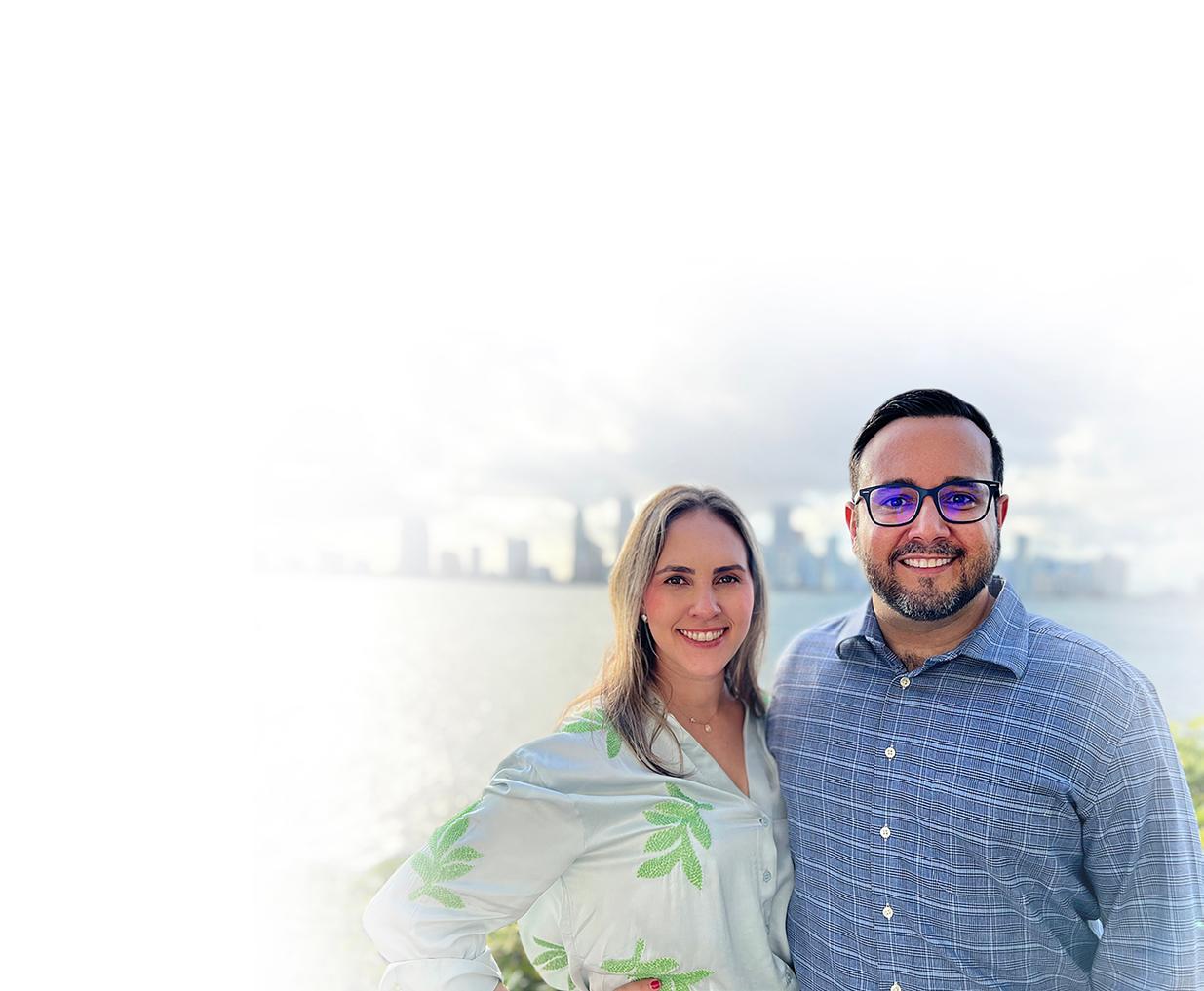
Ask University of Miami alumnus Jonathan Leyva to define the ideal student-athlete scholarship recipient, and the response boils down to a single word: hustle.
“Somebody who works hard, not only on the practice field but in the classroom as well,” says Leyva. “They attend every class; they do their best on all the exams put in front of them; and they embody teamwork, not only with their teammates but with their classmates when they’re doing group projects.”
For Leyva, it’s not solely about getting the best grades. It’s about being able to work well with others, to survive setbacks, and to continue moving forward as a team.
“I think a lot of student-athletes who are ready to go to the U embody that,” he says. “I think there is no harder [educational path] than being a full-time student and a full-time athlete.”
It is this recognition of—and admiration for—what it takes to be a successful student-athlete that was a motivating factor in the couple’s decision to make a planned estate gift to the University to establish the Jonathan and Christina Leyva Football Endowed Scholarship.
“Our goal is to ensure our student-athletes have the support they need to reach their full potential on and off the field,” says Dan Radakovich, vice president and director of athletics. “We are grateful to Jonathan and Christina Leyva for their generous gift, which will help provide scholarship assistance and leave an enduring legacy for our football program.”
As Leyva recalls, it was one of his older brothers who first got him into Hurricanes football. “I went to the Orange Bowl with my middle brother. It was Florida State, 2002—Wide Left. And it was such an amazing atmosphere,” he says. “From there, I became a Hurricane fan.”
Christina Leyva was a cheerleader during her time at the U, which coincided with the ’Canes’ fifth national championship. “It was an incredible experience, lots of fans, packed stadiums,” she remembers.
“We had talked about giving in our community, and
we had always felt there is nothing that has really brought the community together more than University of Miami athletics,” Leyva explains. “When the football team wins, everyone comes together. You saw it in the early and late ’80s, the ’90s, the early 2000s. And now we are seeing that potential again with the hiring of Mario Cristobal.
“We’ve been very blessed and felt that if we could make a difference in this manner, then it was an opportunity we felt obliged to undertake. To be able to do something within your community that adds value, it ends up paying itself tenfold,” he adds.
Christina Leyva echoes her husband’s sentiments and pointed to the value and importance of teamwork in molding young lives. “Jonathan and I have been part of team sports since we were five or six. It really shaped me into that team player, carried over into the workforce, and enabled me to do different things,” she says. “Seeing kids [have that opportunity] to get a lot out of a team sport—it’s just really important.”
This state-of-the-art complex, announced by Miami Athletics in January 2023, will provide the best necessities and amenities in the areas of sports medicine, strength and conditioning, nutrition, sports psychology, and personal branding services. It will also serve as a memorable destination space for recruits and their families, and a home for alumni to visit and reconnect.
“We are excited to announce plans to build this best-in-class, on-campus football facility,” says Dan Radakovich, vice president and director of athletics. “The University of Miami wants to enroll the very best students in all walks of life and investing in facilities is critical to recruit and retain the very best. Facilities serve as a tangible, transformative representation of our overall investment and commitment to success, and this new football operations center speaks to the promise of Miami building championship programs.”
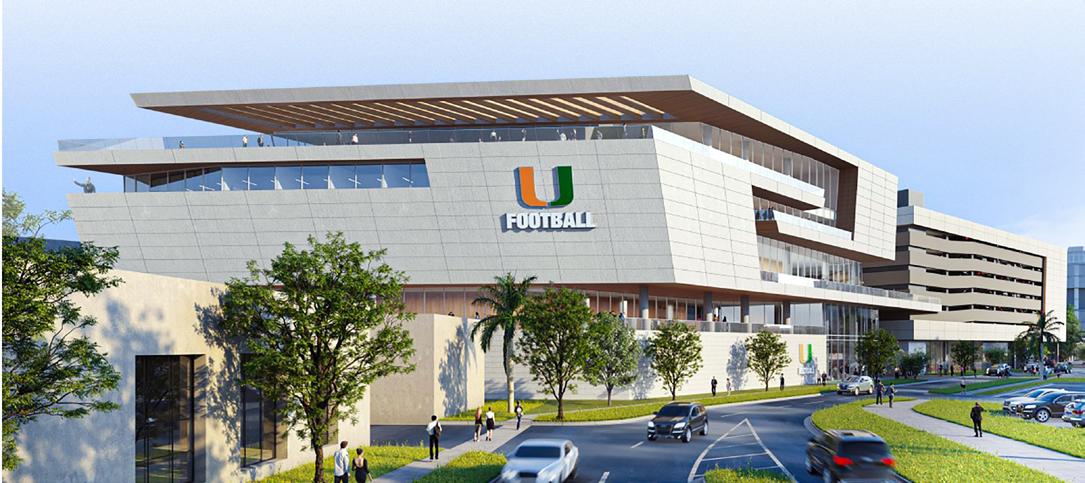
The University has partnered with
Arquitectonica and HOK to concept and design the project, which includes a sevenstory football operations building, a canal bridge connecting to the existing Carol Soffer Indoor Practice Facility, and a parking garage with 555 spaces and a ground-level dining center to serve all Hurricane student-athletes. In all, the facility will encompass more than 172,000 square feet and the overall project more than 215,000 square feet.
The expansive first floor lobby will be open to all campus visitors. The first floor also houses the team locker room, equipment room, nutrition center, and dining hall, which has indoor and outdoor seating areas for student-athletes in all sports. In addition, there is also a second level recruiting corridor, featuring an immersive, 360-degree digital experience showing the past and present of Hurricanes football.
The third floor features athletic training and medical facilities, hydrotherapy, and a
state-of-the-art recovery spa, which boasts high-end amenities such as saltwater float tanks, red light therapy, a meditation room, and a relaxation lounge. The fourth floor contains the team auditorium, all team meeting rooms, as well as the primary recruiting lounge and recruiting reception area. The fifth floor houses locker rooms and a fitness center for coaches and staff. Coaching offices, staff offices, meeting rooms, and player development spaces are located on the sixth level.
The centerpiece of the seventh floor is a 7,500-square-foot rooftop terrace space with beautiful views of campus and the Miami skyline. The top level also houses a digital media lab; a name, image, and likeness (NIL) suite; a golf simulation area; and a multipurpose gymnasium.
“Competing in the rapidly changing landscape of college athletics requires creative thinking and bold investments,” Radakovich says. “We feel strongly that–with the support of our Hurricanes family–we can achieve this new vision for Miami Athletics and set us up for success across all sports for years to come.”
Miami Athletics will soon announce a campaign to help support and enhance the project. For more information, please contact Senior Associate Athletics Director for Development Chris Cohen at 305-284-6699 or e-mail the Miami Athletic Development office at athleticdevelopment@miami.edu.
The visually stunning, seven-story football operations center will elevate the football program and raise the bar for the student-athlete experience.
Susan and Stephen for this transformative gift,” men’s basketball head coach Jim Larrañaga says. “This new facility will help elevate our program to an even higher level and we cannot wait to use it to its fullest potential. It will provide tremendous value to our hard-working student-athletes, helping them excel on the court and pursue their goals.”
Gratitude to the University of Miami for providing some of the happiest times in their lives inspired alumnus Stephen Symons and his wife, Susan, to pledge $1 million towards renovating the current Watsco Center Multi-Purpose Room into a new, stateof-the-art training facility for Hurricanes men’s and women’s basketball.
In recognition of his gift the facility will be named the Susan and Stephen Symons Basketball Training Facility.
“We are incredibly grateful to Susan and Stephen for this generous gift,” says Dan Radakovich, vice president and director of athletics. “The Susan and Stephen Symons Basketball Training Facility will be a game-changer for our rising basketball programs and our student-athletes will benefit from this state-ofthe-art facility for years to come.”
The new facility will cover more than 7,500 square feet and include a strength and conditioning room, recovery area, nutrition bar, and office space for support and medical staff.
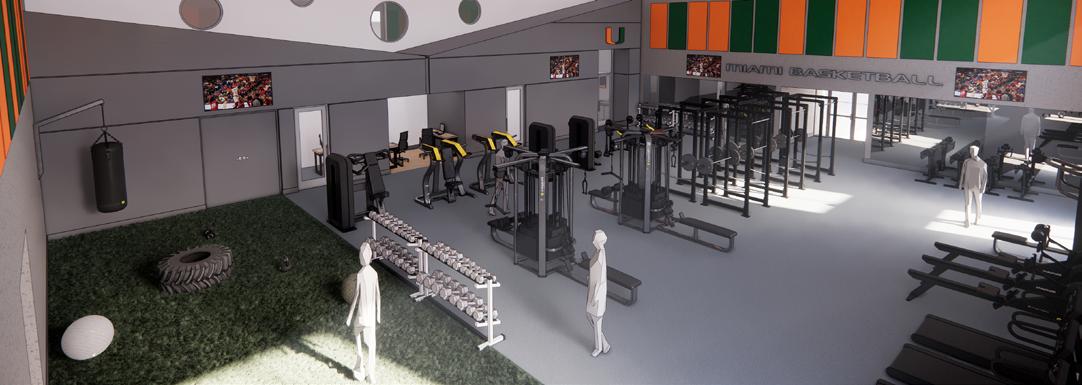
“On behalf of the entire Miami men’s basketball program, I want to express our immense gratitude and appreciation to
“I cannot express how grateful the University of Miami women’s basketball program is for the generosity and dedication shown by Susan and Stephen,” women’s basketball head coach Katie Meier says. “Elite performance on the basketball court is driven not only by strength and conditioning, but also through recovery, nutrition, and medical care. This new, state-of-the-art facility will encompass all those areas, transforming the way our student-athletes train to compete at the highest level.”
The Symons live in Harrisburg, Pa., and Ft. Lauderdale, Fla. Stephen graduated from Miami’s College of Arts and Sciences in 1966, and their granddaughter Elinor graduated from the University in 2022. Stephen is a member of the Golden Canes and a longtime football and basketball season ticket holder.
“The University of Miami is a big part of some of the happiest experiences and memories of my life so far,” Symons says. “And now as my granddaughter is a proud alum of the U, I can assure everyone that the University of Miami will be a big part of some of the happiest experiences in my future. I met Susan in 1964 at the U and we are very proud and very grateful to be able to support sports programs that add so much value to the college and alumni experience. Go ’Canes!”
Longtime ’Canes fans Stephen and Susan Symons have established a permanent legacy with a gift to create a state-of-theart basketball training facility.
Inspired by Rally Caps, a recent film that features a young baseball player with cochlear implants, the Children’s Hearing Program (CHP) at the UHealth Ear Institute hosted an event at a Miami Marlins game to bring awareness to children’s hearing loss.

Held at Loan Depot Park in Miami, the pre-game event included several hearing awareness activities where guests could meet with CHP staff members and learn about hearing loss and hearing health through interactive games. Children from the CHP also got the opportunity to meet the Marlins players before the game.
The young patients were front and center during all the festivities, and the game’s first pitch was thrown out by Kylie Guthrie, a 15-year-old softball player who received bilateral cochlear implants in 2017 after suddenly losing her hearing.
“One of the most powerful things for a child is having peer support,” says Ivette Cejas, Ph.D., director of family support services at the Children’s Hearing Program and associate professor of otolaryngology at the University of Miami Miller School of Medicine. “Because of early identification and advanced hearing technology, many of our children and families end up doing so well that they attend mainstream school, and rarely get the opportunity to be around other children with hearing loss. An event like this gives them natural interaction.”
Michelle and Matan Ben-Aviv’s son, Sam, is a perfect example: He progressed quickly with therapy from the CHP and now attends mainstream school. In appreciation of the care Sam received, the Ben-Avivs have made a
philanthropic gift to ensure that the CHP remains accessible to other families of children with hearing loss. The Ben-Avivs also donated tickets so that those other families could attend the game.
“This is such a great opportunity for kids to come together and see others with cochlear implants be highlighted in a major movie,” says Michelle Ben-Aviv. “It can get really expensive to come to a game, so we wanted to help give kids that experience without families having to worry about the cost.”
“It’s not just for the children, but for the parents as well,” Cejas adds. “During the Rally Caps event, the mother of one of our
new infant patients actually cried tears of joy when she saw a teenager who now has beautiful speech throw out the first pitch. We appreciated the help of our donors, in particular the Ben-Aviv family, who don’t just want their child to have these experiences, but they really want to offer that to every family of a child with hearing loss.”
After a child receives a hearing aid or implant, there are many clinical services needed to develop hearing and language skills, most of which are not covered by health insurance and can place a large burden on many families. This makes donor support critical for the ongoing success of the CHP.
“We want to do everything in our power to make sure other families are able to have this same wonderful experience that we’ve had,” says Michelle Ben-Aviv, who brought her son to the CHP when he was only a few days old. “It’s very clear to us that this is a special place.”

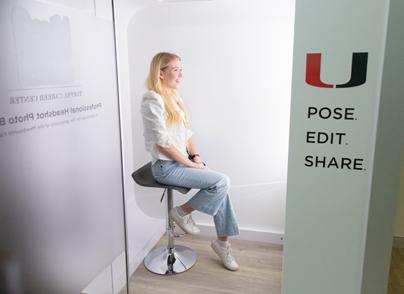
The Toppel Career Center recently unveiled a selfservice headshot photo booth, where students (plus alumni, faculty, and staff) can easily—and at no cost—obtain professional headshots to use on career networking sites and in related settings. The photo booth was funded by a generous gift from the Mewbourne family and will help students seeking jobs and internships get access to this essential career resource.
University of Miami alumnus Darren Dupriest (pictured with his wife, Noreen) is a passionate supporter and advocate for his alma mater. In 2022, in recognition for his earlier commitment to support new student housing at the University, the Dupriest Family Residential Lobby at Lakeside Village was officially named. Opened in 2020, Lakeside Village is a core element of the University’s quest to integrate experiential learning spaces with hightech living amenities that better meet student needs, today and in the future.
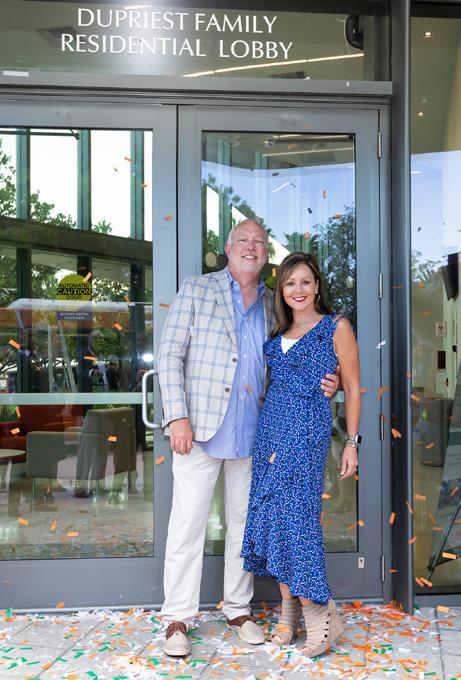
In November 2022, the Miami Herbert Business School celebrated the opening of the Unanue Graduate Career Advancement Center, made possible by a $3.3 million commitment from The Carmen and Joe Unanue Family Foundation. The Center will strengthen the career support Miami Herbert provides its graduate students, helping them to enter the workforce successfully and advance their careers upon graduation. Pictured, from left, Casey Supple, executive director of development for Miami Herbert; Ginger Baxter, assistant dean of career advancement and engagement at Miami Herbert; Marie Unanue; and Andy Unanue.
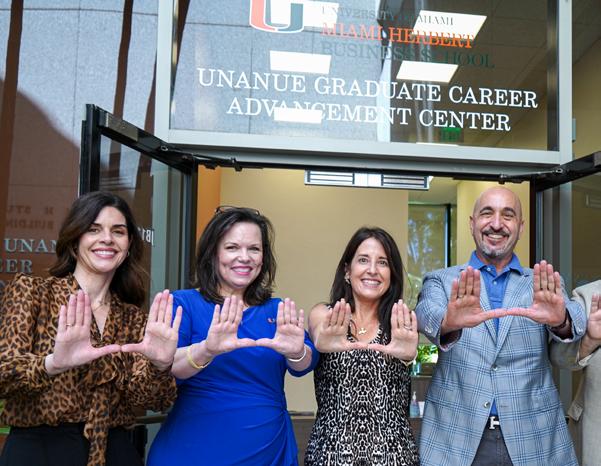
The Chen Family Foundation, led by Chris Chen, M.D. ’00, is looking to expand that shared mission by donating $3 million to establish the Chen Family Endowed Chair to Advance Primary Care and Health Equity Research. The endowment will enable the Department of Medicine to recruit a leader with extensive experience in primary and population health care, who will be tasked with researching and improving the way primary care is delivered, and health equity is advanced, throughout South Florida.
In a way, the Miller School is like an extension of the Chen family. In addition to his father, Jen-ling Chen, Ph.D., M.D. ’81, and younger brother, Gordon Chen M.D. ’05, Chris Chen has other relatives who are Miller School alumni: uncle Peter Chang, M.D. ’79; uncle Kenneth Lo, M.D. ’82; sister-in-law (Gordon’s wife) Jessica Lane Chen, M.D. ’06; and Jason Lane, M.D. ’01, his former roommate and Dr. Gordon Chen’s brother-in-law.
The Chen family’s mission to reduce health disparities is based on the imperatives of their Christian faith to serve and help others. That mission was intensified in 2003, when Dr. Jen-ling Chen was diagnosed with cancer and given only two months to live. At a cancer center in another state, the family experienced what it was like to be on the receiving end of health care where the multiple specialists involved did not collaborate, appointments had to be booked weeks in advance, and compassion seemed lacking.
The elder Dr. Chen recovered and delved into a new mission: developing a method of delivering medical services that provided a superior level of care and positively impacted
patients’ lives. The result is ChenMed, a concierge-style health care practice that operates more than 100 primary care medical practices in 15 states and strives to transform care for the neediest populations.
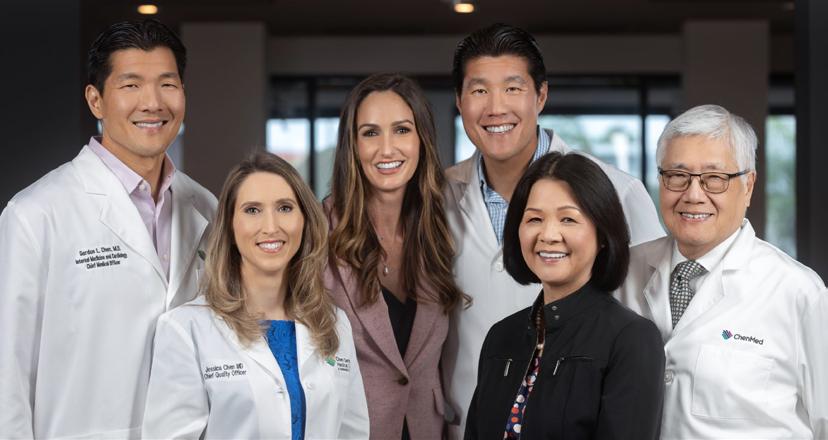
“When we began building out ChenMed, we were very aware of what the delivery system felt like from the other side of the glass,” explains Dr. Chris Chen, who is also CEO of ChenMed. “That drives many of our decisions: What would we want if we were in the patient’s shoes? Our goal was to deliver superior patient outcomes and a positive patient experience to a typically underserved population during the most vulnerable time of their lives.”
“This is why we are investing in the University of Miami,” Dr. Chen continues. “The unique UHealth, Miller School, and Jackson partnership that cares for one of the most racially and socioeconomically diverse populations in the U.S. is the perfect place
to build the beachhead for this movement in academia.”
The Chen endowment aligns with the Miller School’s commitment to health equity and medical education. As home to one of the most diverse populations in the nation, the school is committed to treating patients respectfully across distinct cultures and ethnicities and furthering its mission to improve health equity.
“We have prioritized creating an optimal learning environment for students of all backgrounds because we believe diversity in the classroom produces doctors who are better equipped to serve the patients who need them,” says Henri R. Ford, M.D., M.H.A., dean and chief academic officer of the Miller School. “Health equity is one of the pillars of education that we teach at the Miller School and establishing this chair will help further that goal.”
Multiple generations of the Chen family have graduated from the University of Miami Miller School of Medicine. Like the Miller School, they have a passion for improving the lives of residents in the most medically underserved communities.
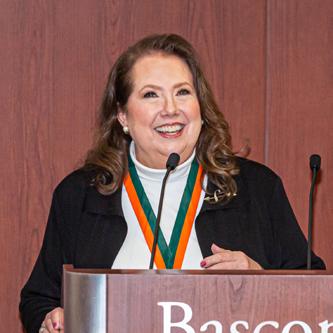
Throughout her career, Alana L. Grajewski, M.D., professor of ophthalmology at the Bascom Palmer Eye Institute, has been a leader in the care of adults with glaucoma, while pioneering innovative treatments of childhood glaucoma.
Her dedication to glaucoma research has led to groundbreaking advances, including the first international research consortium and the first unified international diagnostic criteria and classification system for childhood glaucoma. Currently, she is director of the Samuel and Ethel Balkan International Pediatric Glaucoma Center at Bascom Palmer, the world’s first integrated services center dedicated to helping infants and children with glaucoma.
Wendy and Theo Kolokotrones generously established this endowed chair at Bascom Palmer to promote the advancement of research and treatment in ophthalmology.
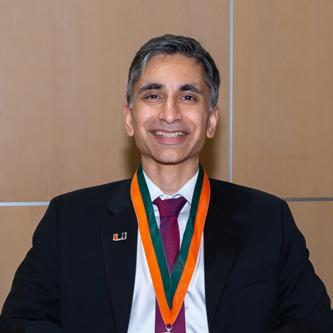
Better understanding of and treatment options for debilitating movement disorders, such as Parkinson’s disease, got a big boost with the appointment of Ihtsham ul Haq, M.D., professor of neurology and chief of the Division of Movement Disorders at the Miller School, as the inaugural recipient of the Cornfeld-Hurowitz Endowed Chair in Movement Disorders.
The chair was made possible through the generosity of Judith and Robert Cornfeld, D.M.D., long-time supporters of the Department of Neurology. Funding from the chair will enable Dr. Haq to continue his quest to improve care for patients through the use of technology, such as deep brain stimulation. He is part of pioneering efforts to improve targeting brain circuitry, while increasing the number of procedures and devices available to patients.
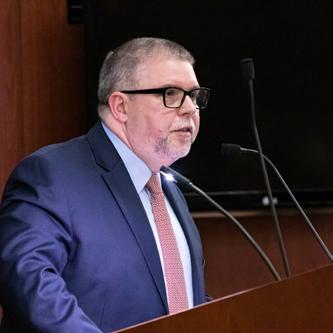
A remarkable partnership between the Harcourt M. and Virginia W. Sylvester Foundation and the Miami Dolphins through their Dolphins Challenge Cancer fundraiser has resulted in the creation of the Sylvester Dolphins Challenge Cancer Living Proof Endowed Chair in Cancer Survivorship.
During a special ceremony in September 2022, Frank J. Penedo, Ph.D. ’99, professor in the Departments of Psychology and Medicine, was installed as the inaugural holder of the chair. An internationally recognized expert in cancer survivorship and treating the full impact of cancer, Dr. Penedo has dedicated his life to increasing the understanding that fighting cancer is a lifelong journey, with a series of emotional, physical, and social challenges that affect not only the patient but the family and caregivers as well.
Donor generosity has enabled the University of Miami to move ever closer to its goal of funding 100 new endowed faculty chairs by its centennial in 2025, helping us to attract and retain the very best scholars. Spotlighted below are six faculty members named to endowed chairs so far in the 2022-2023 academic year.
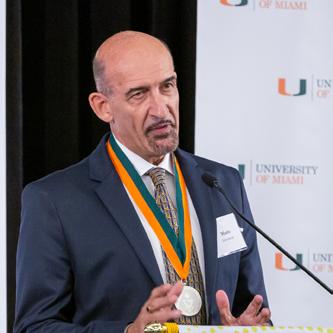
Investigating the amazing properties of nanostructured materials is the central research focus of Luis Ruiz Pestana, Ph.D., inaugural recipient of the Dr. Reza and Georgianna Khatib Endowed Chair in Engineering. Dr. Ruiz Pestana aims to facilitate the creation of better materials to tackle societal challenges, from sustainable infrastructure to clean energy.
The son of a clergyman from Mashhad, Persia (now Iran), Dr. Reza Khatib has been committed to medicine and community service since childhood. After coming to the U.S. in 1958, he built a distinguished career as a neurosurgeon and has endowed chairs at several institutions, including the University of Miami. Dr. Khatib and his his late wife, Georgianna Clifford Khatib, a former teacher and principal at a Manhattan school for the language and hearing impaired,were married for almost 60 years.
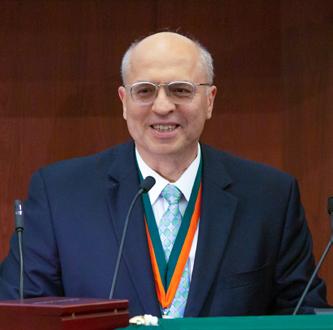
John and Judy Schulte gave generously to the University during their lifetime, but they also arranged to support research and education after their passing. Their legacy will now live on in perpetuity through their gift to Sylvester, which includes the John and Judy Schulte Senior Endowed Chair in Cancer Research. The chair was recently awarded to Wael El-Rifai, M.D., Ph.D., associate director of basic science and co-leader of the Tumor Biology Program at Sylvester Comprehensive Cancer Center and professor and associate vice chair of the DeWitt Daughtry Family Department of Surgery.
Support from the chair fund will allow Dr. El-Rifai, who is also co-leader of the developing fourth Research Program for Translational and Clinical Oncology, to expand his research, which aims to identify and develop novel therapeutic strategies for gastroesophageal cancers.
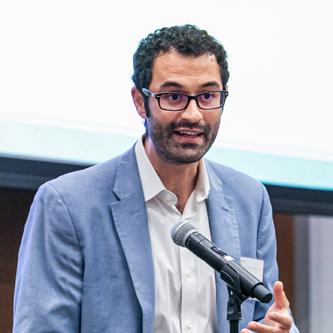
A bond of friendship and a shared passion for finding a permanent cure for HIV/AIDS led to the creation of the Raymond F. Schinazi and Family Endowed Chair in Biomedicine. During a dedication ceremony in Coral Gables, Mario Stevenson, Ph.D., professor in the Department of Medicine, director of the HIV and Emerging Infectious Diseases Institute, and co-director of the Center for AIDS Research at the Miller School, became the inaugural chair recipient.
In addition to being longtime friends—Dr. Stevenson served as Dr. Schinazi’s best man at his wedding and Dr. Schinazi is godfather to Dr. Stevenson’s daughter—the two have both made their life’s work developing lifesaving treatments for infectious diseases.
The chair delivers the potential to transform care and treatment for those who have HIV/AIDS, hepatitis, and other viruses for generations to come.
ANSWER —I got involved in Sylvester [through] knowing people in the community, clients, and family members, who were each touched by cancer. I remember walking into Sylvester’s medical campus facility and thinking, ‘Oh, my goodness, look at all these people who are here because cancer has hijacked their lives.’ I felt a sense of responsibility to get involved and try to do something. At the time, I was only in my late 20s, but I knew that I wanted to try to make a difference.
I started off my involvement by being on a number of committees, which ultimately led to me being asked to join the Board of Governors. After being on Sylvester’s board for a number of years Dr. Nimer reached out and [asked if I would] consider being chair.
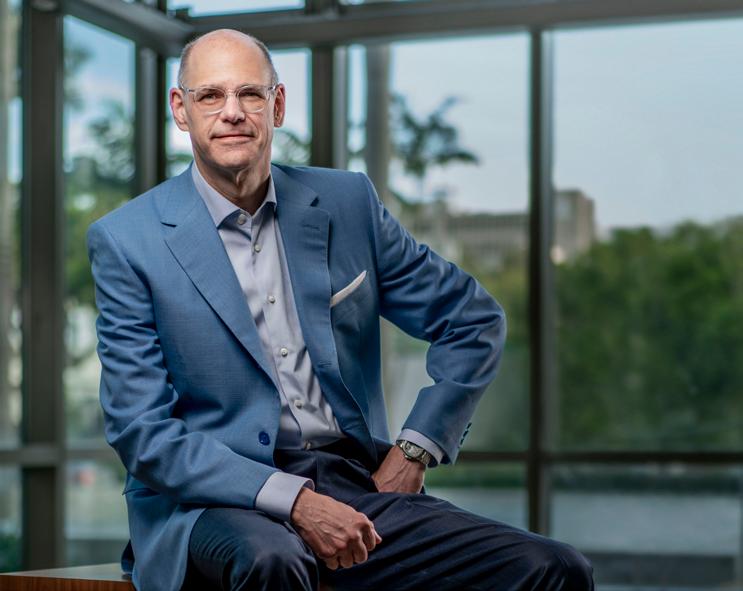
Dr. Nimer is an extraordinary person, because he does not just care about treating the disease, he cares about treating the person. He does not just care about leading an NCI-designated cancer center, he cares about those people who helped make it an NCI-designated cancer center. He does not just care about doing research that ultimately, either helps cure or treat cancer. He cares about the patient and their family members, and their
personal experience felt throughout the treatment. When someone like that asks, it’s an honor and you simply say yes.
ANSWER —There’s a saying: people plan, and God laughs. You never know what tomorrow brings. [For] everyone who’s dealt with cancer, one day everything is fine, and the next day they get that dreaded phone call. As we know, cancer does not discriminate. Cancer doesn’t care what’s going on in your life, [whether] everything’s going wonderfully, or if you’re dealing with all kinds of other problems and stresses. So, it feels good to be able to in some way make a difference.
[As board chair], I did not go to medical school, so I fully understood there was absolutely nothing I could do personally with respect to the efficacy of Sylvester’s clinical treatment. With that in mind, I said to myself: how do we improve the patient’s experience? What must we do to make the patient feel comfortable, at ease, and positive about their experience?
There are all kinds of different things that I’m very passionate about. I’m very involved and truly love the University, being on the board of trustees and the dean’s
The Carlins recently cemented their legacy with a $2 million commitment to the Transformational Cancer Research Building, which broke ground in June 2022 (see pages 10-11). This state-of-theart facility will propel Sylvester toward new frontiers in cancer research, innovation, and patient care.
The Carlins have given to a wide range of programs and causes at the University. They have made meaningful donations to the Miami Herbert Business School, The Miami Project to Cure Paralysis, and, more recently the Phillip and Patricia Frost School of Music, on
whose Dean’s Advisory Committee Carlin serves. Along with his business partner, Richard Bermont, he established the Bermont/Carlin Group Undergraduate Scholars Program at Miami Herbert, now in its 13th year, which supports the Miami Herbert’s most outstanding finance majors.
In addition to his and Chanin’s philanthropy, Carlin is a tireless volunteer. He chairs Sylvester’s Board of Governors and serves on the University’s Citizens Board as well as the boards of The Miami Project to Cure Paralysis, Dolphins Challenge Cancer, and other South
Florida non-profit organizations. His passion for volunteering derives from gratitude for the opportunities that paved the way for what he calls a “truly blessed life” and a profound desire to try to make a difference in the lives of others.
Nowhere have his efforts had a more significant impact than at Sylvester. He dates his involvement to the early 1990s when he attended an event there and met cancer survivors, an experience that profoundly influenced his future path as a volunteer and philanthropist.
Here, Carlin reflects on why giving, volunteering, and Sylvester matter to him.
advisory committee at the Frost School of Music. I’m also very involved in a number of important causes, which I also love. Unfortunately, given that everybody is, in one way or another, touched by cancer, I don’t think that there’s any cause more important to me.
ANSWER —I think [the Transformational Cancer Research Building] is going to feel much different from any other medical facility. The way we’re laying it out, it’s going to be a far more comfortable experience for the patients and even their loved ones. The way we’re allocating the resources for the building will make sure that there is enough space not only for what’s critical today, but what’s going to be important in three, five and even 10 or more years. It’s a building that will allow for the organization to continue its long-term trajectory of striving for excellence for its patients. It’s very exciting!
ANSWER —This is really an incredible opportunity to be part of something that will have a profound impact on how our community’s patients will be treated for decades
to come. I think that once people end up seeing and going into the new TCRB building, who either didn’t give or weren’t asked, they will think to themselves ‘wow, I really wish I could have been part of this.’ In a way, I’m confident it will demonstrate to people that when you’re asked, you should say yes.
There are people who have been very blessed in life. There are many different causes you can give to. That said, the money you give to Sylvester is going to save lives. It’s going to ensure that we are able to continue to hire the best and the brightest to discover cures as well as treatments which tackle the challenges that cancer patients face.
If you are blessed and fortunate enough to have the financial resources, then get involved and help make a difference. What better place than in our brand-new, amazing building, that’s being constructed at an amazing university, which is home to one of the best cancer centers in the world?
ANSWER —When you look out to the future, there’s a plan with people working to make a profound difference. It’s about hope and the future being better than today.
3,200 donors
4,100 gifts
By the time it was over, more than 3,200 donors stepped up, making more than 4,100 gifts for a Giving Day record total of more than $3.2 million. Gifts came from 47 states and 16 other countries—all powering education, innovation, research, service, and student support at the U.
Magnifying the impact were the ambassadors: alumni and friends of the University who encouraged others to give. Andrea Heuson, professor of finance in the Miami Herbert Business School, topped the ambassador leaderboard with 47 donors and more than $26,000 in gifts.
Heuson points to the Bermont/Carlin Scholars as an example of what happens when successful alumni step up on Giving Day.
“Bermont/Carlin Scholars is for high-achieving finance students,” Heuson says. “We take them to New York to get to know our network there, which helps them get internships before their senior year, which [in turn] helps them to get jobs. We are still in touch
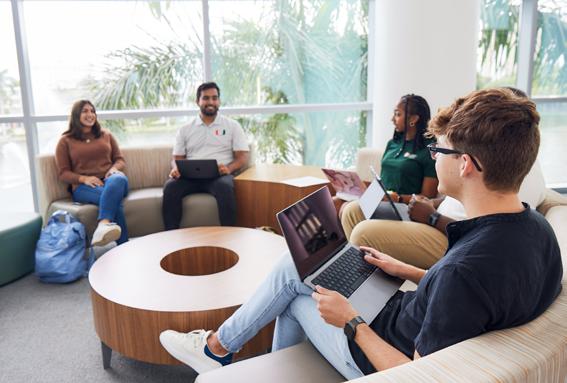
TOTAL OF MORE THAN $3.2 million
47 states
16 other countries

with alumni who have benefitted from what we do here, and who support the people who come after them.”
Matching gift challenges from generous alumni and friends of the U unlocked additional funds.
For example, in the Department of Mathematics, Robert Stephen Cantrell, professor and department chair, pledged to match $2 for every $1 donated, up to a total of $10,000, for the Women in Mathematical Sciences Program Fund.
The program seeks to broaden opportunities for female students in mathematics, through increased access to advanced math courses in high school, increased female enrollment and participation in undergraduate and graduate programs, and career mentoring, among other efforts.
According to Cantrell, the program’s outreach in high schools has sparked enthusiasm for math in students and their families, teachers, and communities. “I have been inspired by the excitement I have seen and offering a Giving Day challenge was my way of trying to spread this excitement. I am delighted that so many folks see what I see,” he says.
In a similar vein, the Yankana family pledged a matching gift to the School of Nursing and Health Studies (SONHS) Simulation Hospital. Chris and Annette Yankana are ’Canes alumni, as are two of their three children, and have been generous supporters of the SONHS’s mission. The family found in the Simulation Hospital “a project we would all be passionate about.”
Josh Friedman, senior vice president of development and alumni relations, hails Giving Day’s success, saying “the ’Cane spirit shone more brightly than ever this year, illuminating the impact that such generosity can have when people come together to support what matters most to them and collectively generate millions of dollars for the U.”
CHAIR, EVER BRIGHTER
Stuart A. Miller, J.D. ’82
CHAIR, BOARD OF TRUSTEES
Laurie S. Silvers, B.A. ’74, J.D. ’77
ALUMNI BOARD OF DIRECTORS
Devang B. Desai, B.A. ’97, J.D. ’03
CITIZENS BOARD
Ana VeigaMilton, B.S.E.E. ’87, J.D. ’93
PRESIDENT’S COUNCIL
Daniel R. Smith, B.B.A. ’89
SCHOOL OF ARCHITECTURE
Bernardo M. Fort-Brescia
COLLEGE OF ARTS AND SCIENCES
Tracey Berkowitz
Clint Bridges
ATHLETICS
Jeff Brown, B.B.A. ’81
BASCOM PALMER EYE INSTITUTE
Ronald Stone, B.B.A. ’73
M. Anthony Burns
Virgil Sklar, M.D. ’80
Eugene Stearns
Jonathan P. Vilma, B.B.A. ’04
MIAMI HERBERT BUSINESS SCHOOL
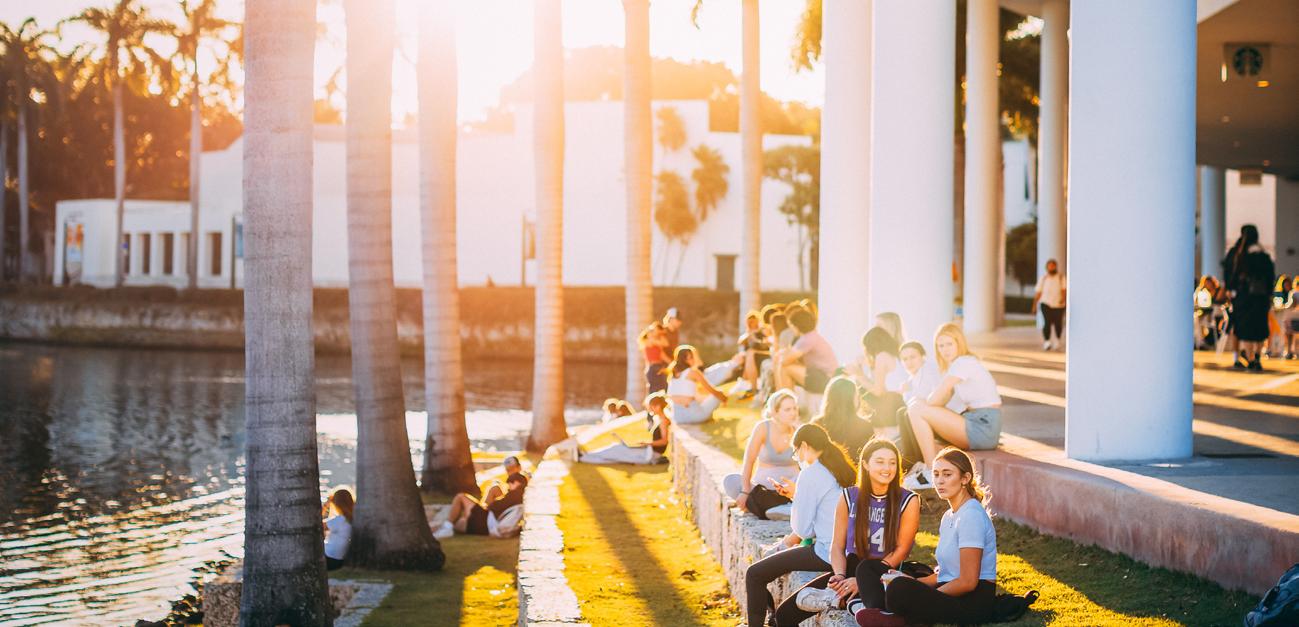
Andrew Unanue, B.B.A. ’91
SCHOOL OF COMMUNICATION
Kim Manna, B.B.A. ’88
Bill O’Dowd
SCHOOL OF EDUCATION AND HUMAN DEVELOPMENT
Pending
COLLEGE OF ENGINEERING
Alan Sirkin, B.S.C.E. ’67
FROST SCHOOL OF MUSIC
Jeffrey Miller, B.A. ’84
SCHOOL OF LAW
Aaron S. Podhurst
Carolyn Lamm, J.D. ’73
Peter Prieto, J.D. ’85
Harley Tropin, J.D. ’77
LOWE ART MUSEUM
Peter Zubizarreta, ’93
MILLER SCHOOL OF MEDICINE
Louise O’Brien
Cathy Siegel Weiss
SCHOOL OF NURSING AND HEALTH STUDIES
Oscar R. Morales, B.S. ’75, M.D. ’79
ROSENSTIEL SCHOOL OF MARINE, ATMOSPHERIC, AND EARTH SCIENCE
Paola Saiontz
Steve Saiontz, M.B.A. ’83, M.P.S. ’13
Wanda Zaiser
SYLVESTER COMPREHENSIVE CANCER CENTER
Adam E. Carlin, M.B.A. ’94
Miguel G. Farra, J.D. ’79
Jayne S. Malfitano
UNIVERSITY LIBRARIES
Aida Levitan, B.A. ’69
Margarita Tonkinson, M.P.A. ’86


















On February 25, 2023, thousands of cyclists, runners, and walkers will take to the streets of South Florida to raise funds for Sylvester Comprehensive Cancer Center during the 13th annual Dolphins Challenge Cancer. Since its inception, DCC has raised nearly $54 million for lifesaving cancer research at Sylvester, making it the largest fundraiser in the National Football League.


